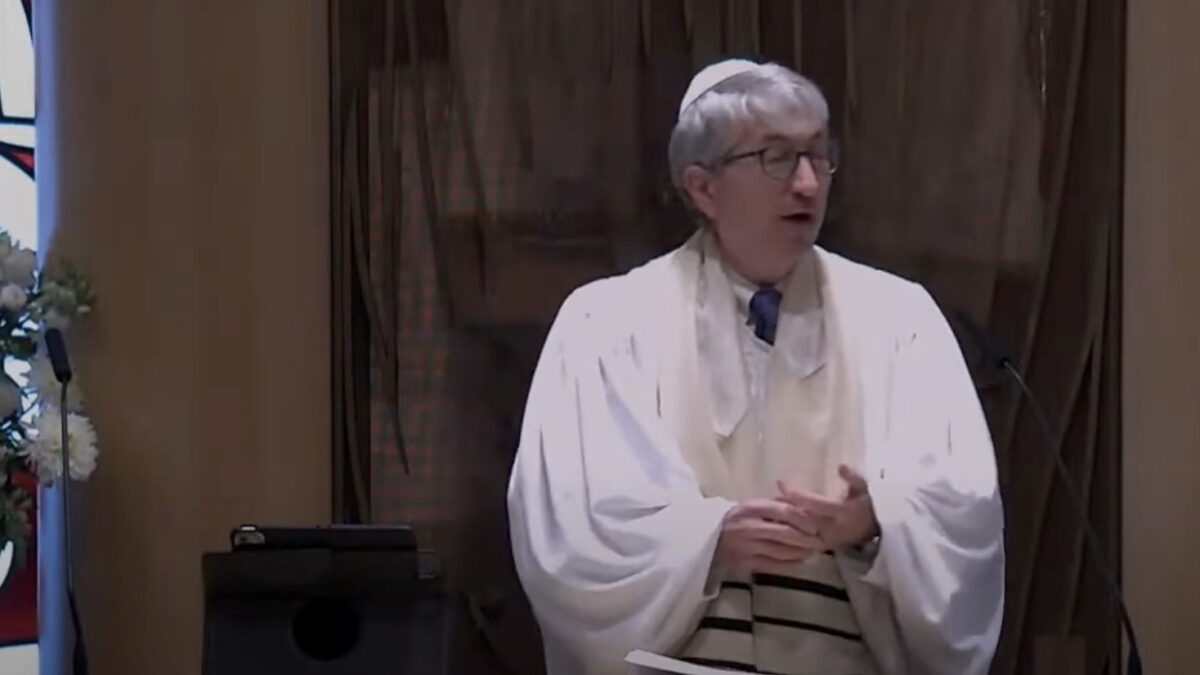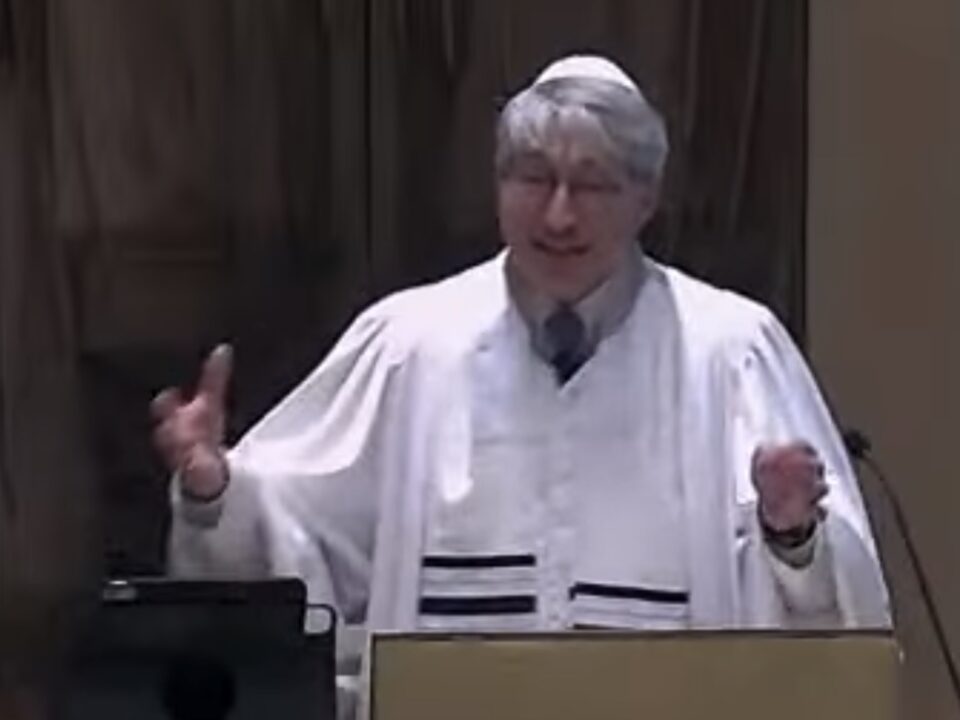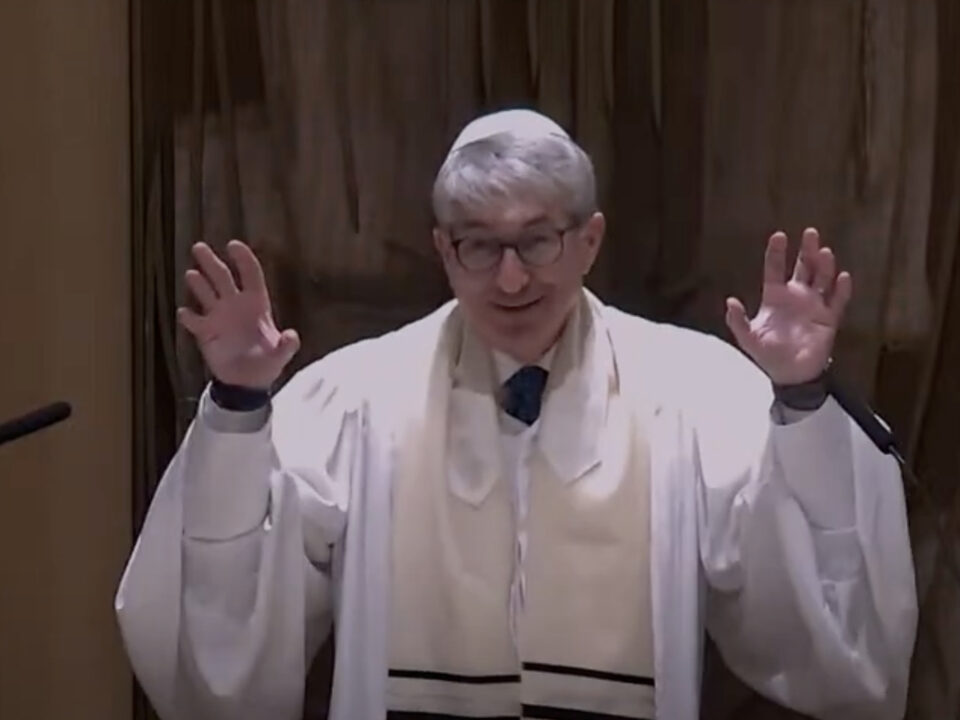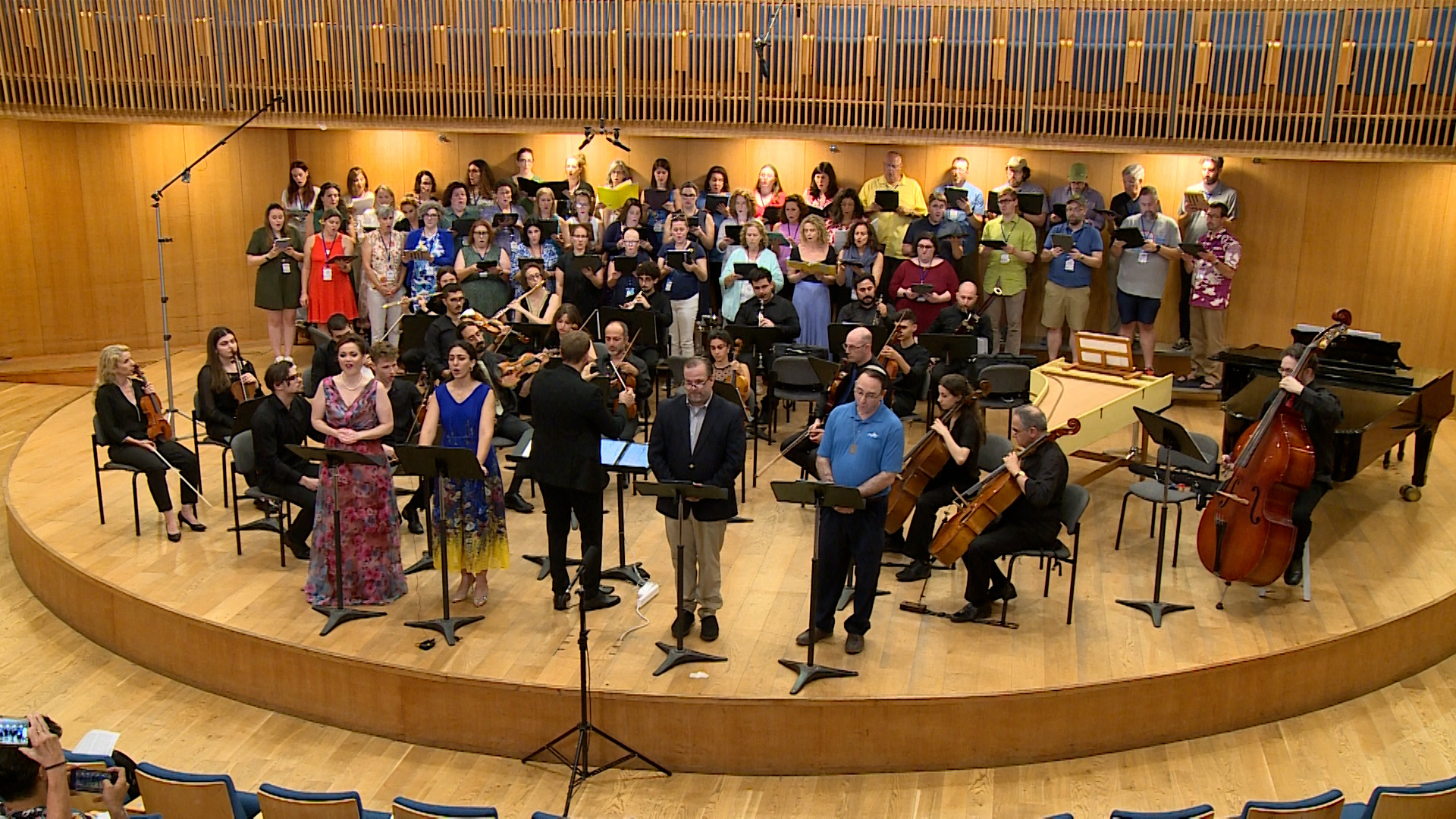
American Conference of Cantors-Convention held in israel
August 22, 2024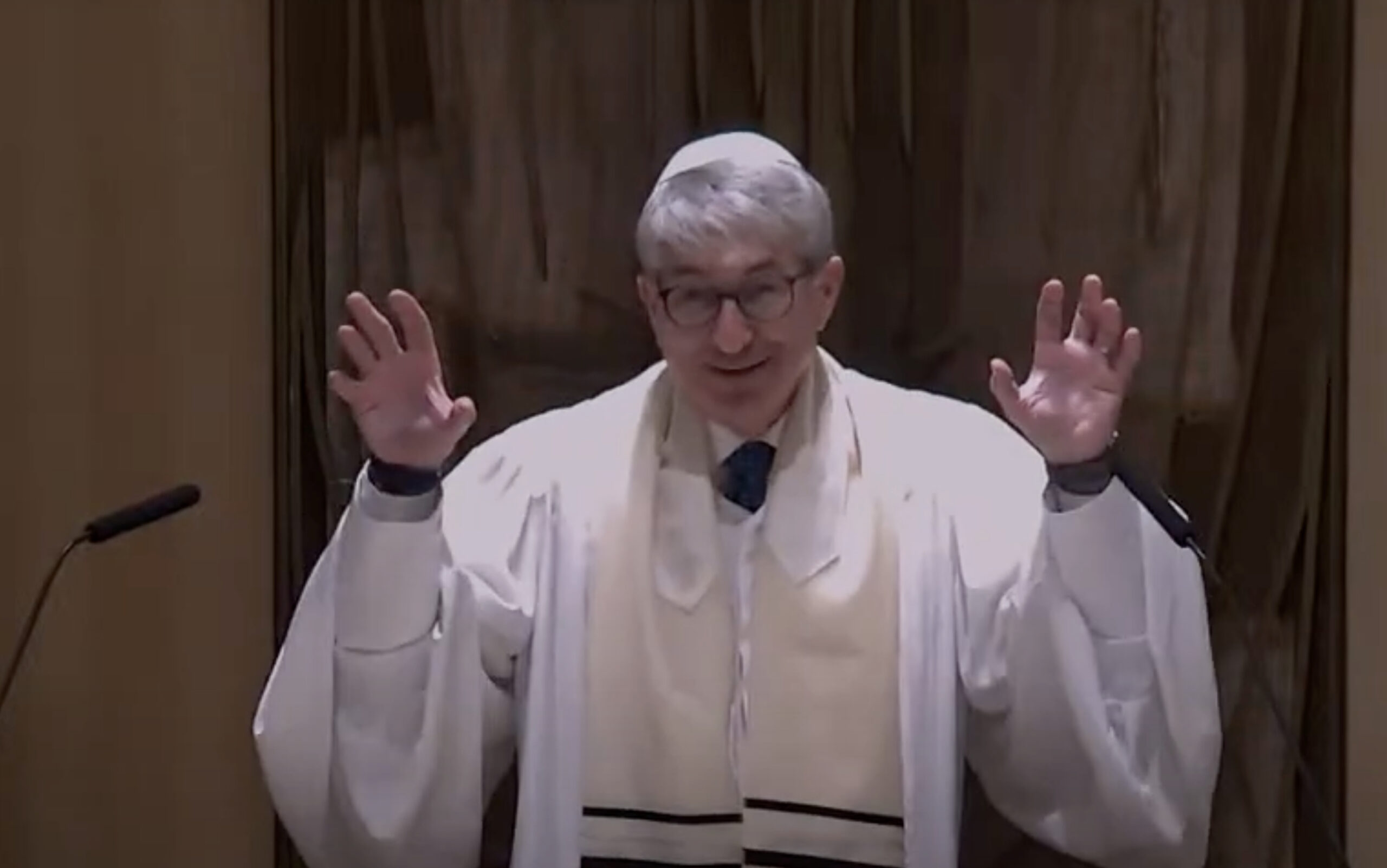
Rabbi Sirkman’s Sermon for Kol Nidre, 5785/2024
October 15, 2024
Since last Simchat Torah, we have been living on either side of a great divide, before and after October 7th, the cataclysm that shook our world.
Last RH, I stood here condemning Netanyahu’s judicial reforms, his “political power grab” that threatened the democratic integrity of the state. Now, challenged as I remain about his coercive coalition—key governmental policies and players, my heart breaks for the immeasurable loss of life, and notwithstanding the question of its character, I fear for Israel’s very future.
In the wake of that unthinkable, premeditated Medieval massacre… Witness to Israel’s ongoing military response, a prolonged war that’s brought not alone continued dislocation and psychological upheaval for hundreds of thousands of Israeli citizens, both North & South, but utter devastation to the people of Gaza…
A campaign still unable to achieve its stated aims: either the release of the hostages, still held, or the decimation of Hamas… With all our hope for some resolution towards a secure Israel and a sane, somewhat more peaceful post-war solution on the ground, a different dividing line has been drawn…Zionist—Anti-Zionist.
The operative assumption in drawing this line, even entertaining the term anti-Zionist as applied to any of us Is that when it comes to being part of this peoplehood, Israel is a choice.
After all, for us as progressive Jews, isn’t everything? GOD is all about what we, ourselves, decide to believe. For us as Reform, there’s no dogma when it comes to the Divine. TORAH is a revelation each one of us hears uniquely. It is up to each of us to live it out as we feel obliged. Shouldn’t ISRAEL be more or less the same? In a sense, it is… For as sure as we differ about what Israel means and how it should create a Jewish state, being an anti-Zionist implies something much more drastic: discarding this key cornerstone of Jewish existence altogether.
Being disturbed by the decisions of its leaders is one thing. Deciding Israel should not exist: That is a negation of Covenant itself.
So, in the context of today’s debate drawn with that dividing line, does your dissatisfaction with the current state of affairs or your disagreement with Israel’s current policies put you beyond the pale, or make you an anti-Zionist?
Actually—it makes you just the opposite.
ZIONISM is as old as our people itself. Born at the very beginning when Abraham got God’s call: “LECH L’CHA” —Go forth to a land that I will show you [Gen 12:1]. And we’ve been on that journey ever since. The promise at the heart of our people, the prayer which leads to that sacred place, is a summons that never stops, a perennial return which holds our highest hope: “Next Year in Jerusalem.”
But aren’t we already there?
Truth is, living through this past year of despair, with the decades-long-unfolding struggle to make Israel HOME, in the words of Israeli author-activist David Grossman, We have quite a way to go…
Home is the place I exist with ease, a feeling of security, of belonging… A place whose borders are acknowledged by everyone, in particular, my neighbors…But…still engulfed in a yearning that has never been fully achieved, at present, I fear that Israel is more a fortress than a home. [NYT, Op Ed, 3.3.24].
If Zionism is the Jewish people’s right to self-determination and self-governance in its ancestral home, then how we get there makes all the difference!
Theodore Herzl, a secular, Viennese Jewish journalist, the father of Political Zionism, responding to the antisemitism embedded throughout Europe, convened the first meeting of the World Zionist Organization, endorsing the Basel Program in 1897. Working tirelessly to solve “the Jewish problem,” through political means, engaging in shuttle diplomacy with princes and kings, Herzl mustered enough support for what could someday—so he dreamed, be a sovereign Jewish state.
But his vision went far beyond the political. For he, too, a secular Jew, was answering that sacred call, as his oft-quoted one-liner echoes: “If you will it, it is no dream.”
These days, when the reality on the ground feels more like a nightmare, with conflict & controversy tearing at the heart of our people, how do we keep the dream from dying? [or simply fading away?]
To begin with, by not mistaking our differences for a dividing line. For when we respond to that ancient call, as we enter that contentious, complicated conversation, undertaking the journey whose steps are the struggle of what Israel must be, and must aspire to become, make no mistake—we are heading towards home.
Last fall, the Shabbat after October 7th, we handed out “I Stand with Israel” buttons. I put one proudly on the lapel of my regular Shabbat blue blazer, along with a yellow ribbon for the hostages on the other side.
By mid-November, after the President of our movement Rabbi Rick Jacobs presented at LT on Reform, including insights from his time in Israel that week, from all the questions, we knew we needed a deeper dive on the State of Israel …And so four Conversations in Modern Zionism were held with David Leshnick, our LT tour guide of 30 years, live, from Jerusalem.
Subtitled: Real Answers to Today’s Impossible Questions, these talks affirmed how little historic grasp most folks had, and how complex the questions really are…among the takeaways was that it is not oxymoronic to support a strong, secure Jewish State and hope for an end to the suffering of the Palestinian people in Gaza.
Case in point, end of January, we hosted a stirring presentation by 30-year-old IDF special forces reserve commander Shahar Peled, [thanks Wendy!]among the first on the ground October 7th, whose unit spent almost 3 months in Gaza, combatting an entrenched, dare I say, evil enemy while struggling to maintain his unit’s morality…As he admited, often, “almost impossible.”
And w/early spring…death tolls rose and spirits sank, as Hostage Square became the stage for opposition with Hezbollah rockets being fired up north & regular incursions down south.
Somewhere amidst the racist rants of Israeli cabinet members and increased unchecked settler violence in the West Bank… Amid the 7 World central Kitchen workers’ accidental deaths, the 21 IDF soldiers blown up just building a buffer, the 12 Druze kids murdered by Hezbollah while playing soccer, keeping on my yellow ribbon, I quietly took off my button.
Mind you, not because I no longer stood with Israel. On the contrary, my commitment to Israel is beyond question. But how could a tiny “I Stand with Israel” button make clear my belief, the actual complexity of my stance? How could it convey the extremism and hatred I stand against? How could it capture the moral, humane vision of Israel for which I stand?..
After a couple of days, that place over my heart felt sort of empty, so, I pinned on a little Israeli flag instead.
“Zionism is not a political ideology,” writes Amanda Berman, founder of Zioness, a nationwide grassroots organization fighting for a progressively proud Israel.
The modern Zionist movement was about the creation of a sovereign state, not the politics of that state. With all its policies and politics, the State of Israel is subject to criticism and critique, and ongoing question when it falls short of its democratic ideal. Zionism…is a cornerstone of our covenant, not a political expression but a national aspiration, a fulfillment of our faith.
When I first heard a comment from a colleague about the President of HUC’s talk at the 2nd Recharging Reform conference this past June as to whether or not the College-Institute should admit “Anti-Zionist students,” I thought: “Really? Say YES to Torah and NO to Israel, and you’re in!?”
But rather than read second-hand reviews, I went to the source, asking Dr. Andrew Rehfeld. [Full disclosure, a guy I work for, admire as a leader, and is an LT member.] Reading his presentation brought perspective and helps us understand what it might mean for us to respond to that “Call.”
His contention in a nutshell: in keeping with the aims of a liberal education, the serious search at the heart of Reform Judaism, asking students for a pledge of Zionist allegiance when they enter would negate our process/purpose. As he put it:
We cultivate an environment where students come to understand on their own terms why we, a Jewish institution committed to the principles of progressive Zionism, believe that the Jewish people have a right to live freely in their own secure, democratic homeland…The grappling cannot be done in a serious way if the conclusion is foreordained.
The fine print on his button was clear:
The Zionism we support, that the Jewish people have the right to live free in their historic homeland, (1) controlling state power for the sake of self- defense, (2) advancing the flourishing of the Jewish people in a manner limited by democracy and (3), respecting the human rights of all who are subject to that power.
As the President of HUC asserts: “Not one or two of them, but all three.” You don’t have to be a rabbinic student for the debate to resonate.
So long as you are grappling, struggling for a more humane, and sane Israel, in dialogue with others who may see it differently, you are heading towards Home…
Still, with that Z-Word so supercharged today, with all the tensions it triggers, from the college campus to progressive circles of discourse, just mentioning it puts us in very touchy territory…
The deep irony of a Brooklyn bookstore banning the talk between Joshua Leifer, 30-year-old Yale PHD student, author of the recently released Tablets Shattered, and my colleague Rabbi Andy Bachman, because he—the rabbi—was a Zionist, is a window into the debate that’s become for some a great divide.
“We don’t want a Zionist on our stage,” the Powerhouse bookstore staffer [let go later that week] was quoted as saying.
Bachman’s response underscores the urgency of our clarifying just where we stand:
My Zionism,” said the Rabbi—among the most progressive voices “demands that we also recognize Palestinian claims on a national homeland. I believe in sharing the land. Period. But it appears the only acceptable Jew in this moment is the one who believes that Israel should not exist.
Ironically, it was author Josh Leifer’s own estrangement from Israel which, in part, compelled him to write the book. Raised in a Zion-centric Jewish day school in NJ, struggling to this day with what the Jewish state must be, Leifer described his current connection by noting: “Anger, after all, is a modality of attachment.”
Though banned from the bookstore, Leifer and Bachman had their dialogue a few days later at CBE’s extension—Union Temple in Park Slope, before a crowd of 400 people…[Ten times the expected original.] And it was Leifer who encouraged everyone there, and us as well, to never be knee-jerk when it came to Israel, but to engage in the struggle.
For what we have discovered this past tumultuous, traumatic year is that, unless we deny Israel’s existence outright, there really is no divide. We are a wide-scoping spectrum, a multi-temp tent with room for all. In the words of the late Village Voice/Rolling Stone prof. of journalism Ellen Willis, we are “Anti-Anti-Zionists…” [2003]
Calling for the critical scrutiny the democratic state of Israel requires, which should inspire us to reconnect rather than reject her, compelling our response to that ever-echoing call…
Naturally, the generations often hear it differently.
A few weeks ago, a letter in The Bintel Brief, the over 100-year-old Jewish [used to be Yiddish] advice column in The Forward featured a letter from a distressed parent which could have come from most any of us…
Dear Bintel,
My daughter, who lives in another part of the country, has changed her political views and is totally against Israel. When we speak, I remain calm and try to understand, but I am disappointed with her. How do I handle this challenge?
Noting that she’s not at all alone, the Yiddishe Dear Abie answered:
Dear Distressed,
The October 7th terror attack and ensuing war in Gaza has caused what’s probably the single-biggest intra-communal rift the American Jewish Community has ever experienced…
Then, after suggesting that Israel simply be off the table, [not happening]. Bintel suggested guardrails for such conversations, how to disagree in a civil way, by starting with the question: “What do you hope to see?” As Bintel points out:
This reorients people to the future of the region instead of a litany of wrongs each side has committed,” noting, “It is not a question of labels: Zionist vs. Anti-Zionist. You might be surprised at the values & goals you and your daughter actually share.
Herzl’s call is meant for us all, “If you will it, it is no dream.”
In the face of despair, we dare not lose sight/hold of that dream. Here’s mine. [Inspired by Rabbi Josh Weinberg’s Yom Ha-atzma’ut article, ARZA]:
I am a Zionist because I believe no people should be hated for wanting to go back home, a Promised Land whose promise depends, ultimately, upon us…
I am a Zionist who believes a secure Israel only comes with a resolution to the conflict with the Palestinian people through the establishment of a two-state reality.
Not today or tomorrow, but someday.
I am a Zionist because I believe in a democratic Jewish State which affords equal rights to all its citizens, including the 21% who happen to be Arab.
I am a Zionist because a pluralistic, egalitarian society must provide a safe space for all regardless of gender or race, and be open to many paths of being Jewish, a place where human dignity is the birth right of all.
I am a Zionist who believes that there is no place for demonization or delegitimization of Israel…AND likewise
I am a Zionist who insists that Israel’s leadership must live by the sacred moral standard to which we as Jews are called: “To be a Light to the Nations.”
I am a Zionist because I believe Zionism is part of what it means to be Jewish, an inextricable piece of the Covenant we keep.
Israel is our extended family, and much like our own families, there are some cousins we think are crazy, some with whom we feel especially close, and others with whom we diametrically disagree… Rather than walk away, being a Zionist today in the widest sense of the word means standing with our people/family, punim to punim…heart to heart, there to critique as we are there to care.
My friend, our LT Tour Guide of three decades, David Leshnick’s words to me, week before last, convey how hard it is not to lose hope…
In the meantime, the war goes on, the government is ruthless [more to the Israeli public than the enemy, I think]…Leaders still don’t take responsibility, and there’s an overall depression despite trying to live somewhat ‘normal’ lives.
Carrying their hopes in our hearts…how can we not be there to help hold them up?
Consider three ways in the coming months & days you can Stand with ISRAEL,
no matter exactly where it is you stand…
(1) JOIN US in THANKS4GIVING, the mega-mission of Project 24, a grassroots organization which supports the communities hardest hit by 10/7, creating projects in partnership with the American Jewish community…
With 400 emergency first-responders and their families from the Gaza Envelope kibbutzim coming to New York, LT will be hosting 8 families from Kibbutz Be’eri, 11/10-17. It’s of special note that Be’eri was predominated by Peaceniks, who created a mitzvah corps for the Gazans working every day on their kibbutz, even driving many Palestinians to oncology appointments in Southern Israel.
When Hamas attacked, over 100 kibbutz members were murdered, [10% of the residents] 125 homes were destroyed…Most all are still displaced, hoping to go back home…
WE will open our homes and our congregational home to them… To share in the collective care, be in touch with Katie Schein or Ariana Cohen, our LT-Kibbutz host co-chairs…[More info to come!]
(2) VOTE in the World Zionist Congress, yes, the one Herzl started…known today as The Parliament of the Jewish People, the every 5-year election, coming up in 2025…Putting your voice where your values lie by voting for ARZA, the American Reform Zionist Association, empowers us, along with our Israeli Reform partners, to stand for a strong Israeli democracy by allotting more of the $1 Billion dispersed to causes that foster pluralism and peace.
(3) JOIN in our projected Israel Solidarity Mission of Healing & Hope this February 13-19, Led by me and the Cantor…A chance to connect with displaced Israeli Families, people on the ground fighting for democratic freedom, bridge builders, both Arab & Israeli, working to create a better tomorrow… We’ll see firsthand their struggles, connect through our care, and do whatever we can to help…
The news every day, now as of a couple days ago, from Beirut to Teheran, is driven by mutual destruction…but we must not allow the stalemate of hate to lead us to lose hope… It is painfully poignant that our collective hope comes from our heartbreak. Rachel Goldberg-Polin’s urging in eulogizing her son Hersh, one of the six brought back to Israel having survived 11 months of captivity only to be executed just days before being discovered, praying that his death would be “A turning point.” She pleads: “I beg of you, do what you can to have your light shine down. Help us to rise again…”.
For many of us who wear that flag on the inside, or even outside, for our brothers & sisters in hostage square waving it in hopeful defiance, For soldiers defending it, For all Arabs & Israelis, war torn Palestinians & homeless kibbutzniks…the dream remains. War will not defeat it… yes, we know, we have quite a way to go… the path is long, difficult, demanding…yet it is still paved with hope.
So stand with Israel, even on very shaky ground. Be part of the conversation, filled with more questions than answers. For it is the struggle that makes us who we are—relentless, resilient, that makes us what we must be: a light to the nations, an Israel that is, will someday soon again, feel like HOME…
So with the Holy One’s call resounding for us all, this New Year…May it Yet Be….AMEN.

